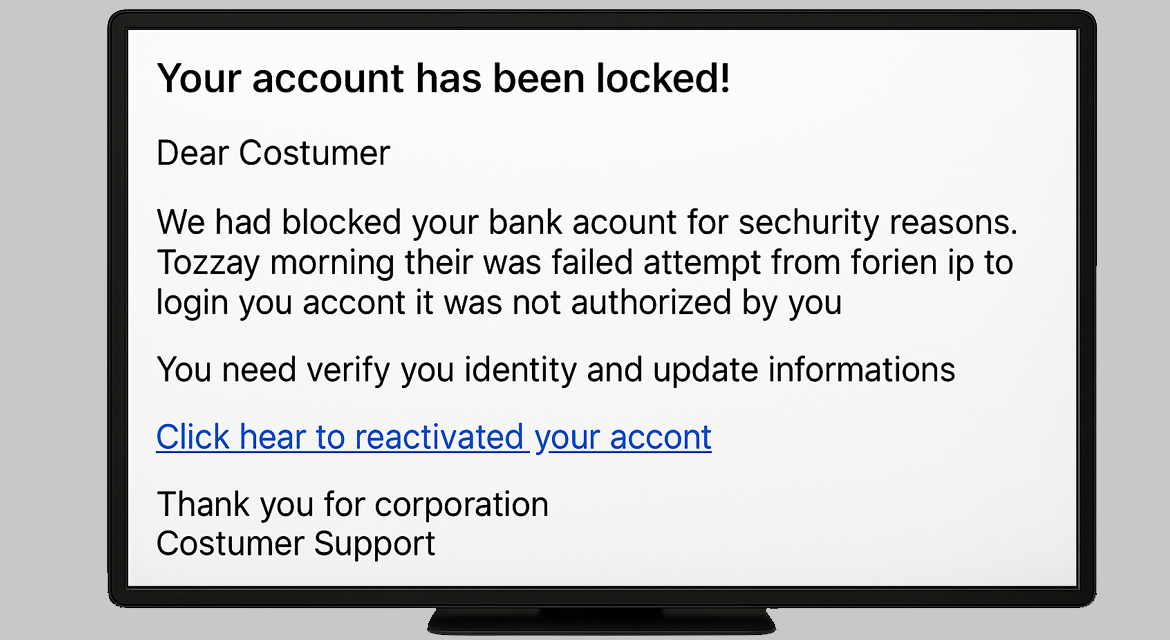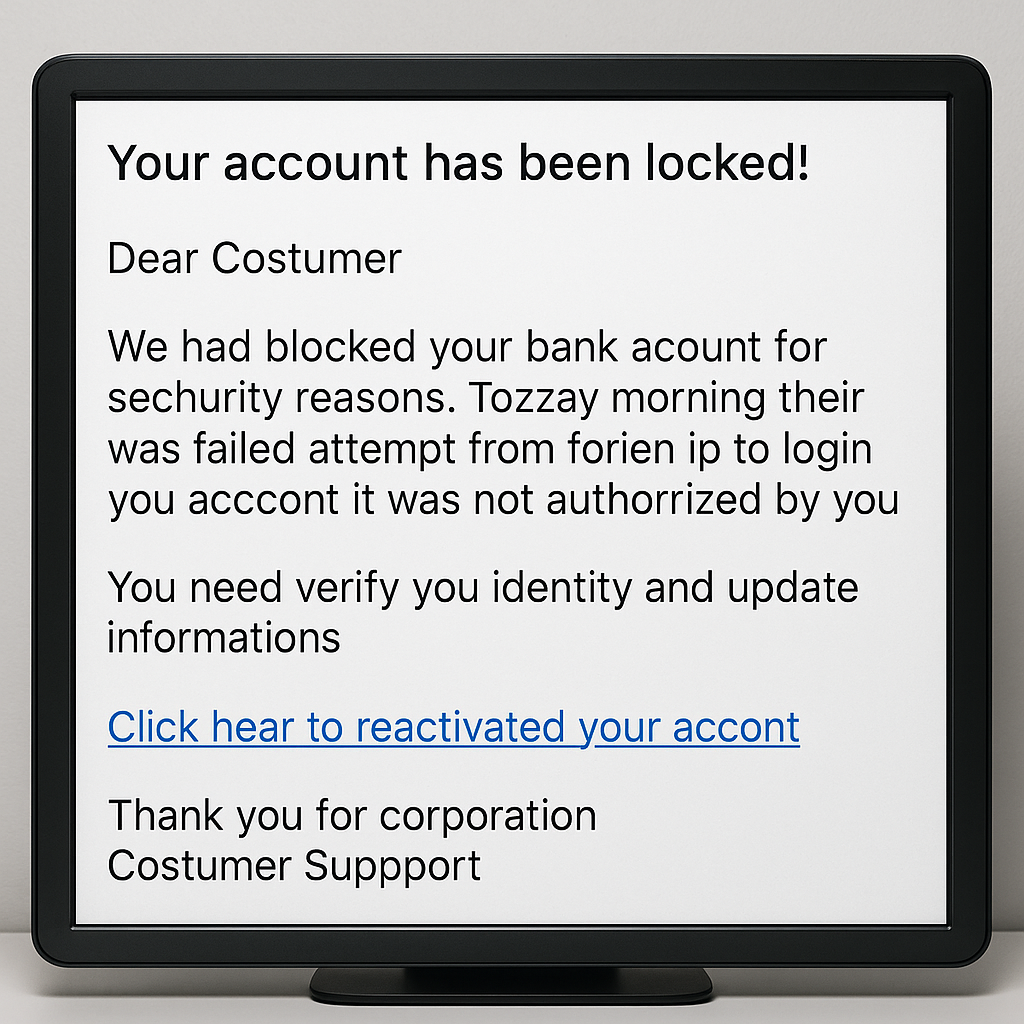Let’s be honest: the quickest way to spot a scam email is to hunt for its grammatical carnage. Commas materialize in places where even seasoned linguists wouldn’t dare tread, and other times, they’re as rare as a real royal inheritance. One minute, you’re halfway through a sentence, and suddenly you’re gasping for air, lost in a sea of clauses that never seem to end. If the scammer’s ultimate goal is to exhaust you before you reach the part where you’re supposed to give them your Social Security number, then mission accomplished. Imagine a world where a comma could save your fortune—one well-placed punctuation mark might just be your best defense.
Consider the classic: “Dear Friend, I am write, you with urgent, business proposal for benefit, reply soon.” Grammarians everywhere weep a single tear. If only a proofreader were involved, maybe your “business proposal” wouldn’t look as though it had been dictated by a hyperactive parrot with a broken typewriter.
Misspelled Words: The Red Flags That Practically Wave Themselves
The rogue’s gallery of misspelled words in scam emails reads like a spelling bee for the bold and bewildered. “Congradulations!” “Recieve!” “Account Susspended!” These are not typos; these are full-fledged assaults on the English language. The best part? Sometimes these mistakes are so consistently awful that you start to suspect the scammer is doing it on purpose—as if “winned” is a secret code only the truly gullible can decipher.
Let’s not forget the infamous “costumer”—a title presumably reserved for those who enjoy sewing or Halloween. For scammers, a spellchecker might be the most powerful tool since the invention of the “delete” key. It’s free, it’s easy, and it’s apparently as elusive as an honest phishing attempt.
All Caps and Exclamation Marks: Because Subtlety Is for Suckers
When was the last time your bank screamed at you? Never, right? Yet in scammerland, the louder the better: “YOU MUST REPLY IMMEDIATELY!!!” “CONFIRM NOW OR FACE CONSEQUENCES!!!” These emails read more like a panicked toddler’s plea than a professional communiqué. Excessive capitalization and an overabundance of exclamation marks are the digital equivalent of standing on a street corner and yelling, “Trust me!” to strangers. Spoiler: It doesn’t work offline, and it certainly doesn’t work online.
There’s a certain charm to the melodrama, though. After all, if your account truly was in jeopardy, surely a series of dramatic exclamation points would fix it, right? Next time you see an email with more “!!!” than actual content, consider it a neon warning sign—one that’s best left unread.
Punctuation: Optional, Apparently
In scam emails, punctuation is more of a suggestion than a rule. Periods and commas come and go without warning, and semicolons are as rare as unicorns. One epic sentence might contain five demands, three threats, and not a single stop, leaving you breathless and confused. It’s as though punctuation is being rationed, saved for a rainy day, or perhaps hidden behind a secret paywall scammers refuse to subscribe to.
For example: “Please kindly provide your bank information urgently to claim your winning prize it is very important that you respond quickly do not ignore this message time is running out.” At this point, you’re not sure if you’ve won a car, lost your identity, or simply taken a wild ride on the grammar-go-round.
Syntax Sins and Grammatical Gaffes
Syntax is the invisible scaffolding that holds a sentence together, and scammers seem intent on tearing it down. Their emails are a cacophony of mismatched verbs, dangling modifiers, and sentences that crumble under even the gentlest scrutiny. “I am lawyer of the bank for your inheritance delivery is ready for you.” Is the lawyer ready, the inheritance, or the delivery? Maybe it’s all three. Maybe it’s none. The only certainty is confusion.
While some claim these errors are intentional, designed to weed out the wary, it’s far more likely our would-be fraudsters simply skipped English class—and possibly every other class, too. If the message reads as if it’s been run through a blender, trust your instincts and back away slowly.
The Suspiciously Sincere Salutation
Scammers have a flair for the dramatic opening. “Dearest Beloved,” or “Esteemed Sir/Madam,” might be how you address a long-lost pen pal from the 1800s, but it’s hardly how your bank greets you. These flowery phrases are meant to flatter, yet end up feeling forced and vaguely robotic. If you’re ever welcomed with “Greetings of the day to you dearest beloved,” check for hidden cameras—or bank fraud.
The more elaborate the salutation, the less trustworthy the message. It’s as if scammers are desperately trying to butter you up, hoping you’ll be so charmed you’ll overlook the request for your routing number.
Hyperbolic Hooks: The More You Wait, the More You Lose
One hallmark of scam emails is their love for hyperbole. “Act now or lose everything!” “Your entire fortune hangs in the balance!” The drama is dialed up to eleven, as if a Shakespearean tragedy is unfolding in your inbox. Real organizations don’t threaten to implode your world if you don’t reply within 0.2 seconds.
This relentless sense of urgency isn’t meant to help you—it’s designed to short-circuit your judgment. The only actual emergency here is the state of their grammar. If their command of English is in intensive care, your personal data should be, too.
Fake Names and Unlikely Signatures
Scammers adore creative aliases. “Attorney General Linda McJustice.” “Bank Manager Prosper Richman.” Or the unforgettable “Mrs. Happiness Winner.” Sometimes, they don’t even bother personalizing the template, leaving you with “Sincerely, [Insert Name Here].” These signatures are as believable as a three-dollar bill, and twice as entertaining.
If the sender’s name sounds like it was dreamed up by a cartoon villain, it’s a safe bet the email is not from a trustworthy source. Smile, delete, and move on—no need to send your love (or your money).
The Good, The Bad, and The Unintentionally Hilarious
Sometimes, scam emails are so catastrophically written that they provide more laughter than danger. Gems like, “Your ATM card is with us for delivery kindly send your address and phone for good communication,” are comedic relief in an otherwise stressful inbox.
Or the tragic saga: “I am widow suffering from cancer and my late husband left money for you because angel appeared to me in dream.” It’s touching, until you realize the only thing heavenly about the story is the leap of imagination required to believe it. If you’re in need of a good chuckle, your spam folder awaits.
The Secret Weapon: Grammarly (Or Any Proofreader, Really)
Scammers, hear our plea: invest in a proofreader! A single round of spellcheck could transform your operations from laughable to (almost) legit. Imagine the horror if a scam email ever arrived with perfect punctuation and seamless prose—would we even recognize it as a scam?
But don’t worry too much. Your grammatical disasters are our safety net. Each hilarious blunder is a gentle nudge, reminding us to delete and laugh rather than click and regret. So in a way, your lack of proofreading is a public service—and for that, we thank you.
Protect Yourself: The Language Lover’s Guide to Not Getting Scammed
- Look for errors: Sloppy grammar and spelling are as good as neon “Do Not Enter” signs.
- Check the sender: Apple does not use Hotmail. Trust us.
- Beware urgency: If it needs to happen “NOW!!!,” it can probably wait for a grammar check.
- Never click links: Unless you’d like your device to take its own vacation.
- Trust your gut (and your inner grammar nerd): If you’re addressed as “Dearest Beloved Costumer,” close that tab and treat yourself to a real compliment instead.
In Conclusion: The Proof’s in the (Bad) Pudding
At the end of the day, scammers could elevate their game with a simple investment in basic English skills. Until then, their mangled prose and misplaced punctuation serve as our digital armor. So, inbox warriors, stay vigilant, keep laughing, and remember: in the grammar of grift, only the unproofread get left behind.












